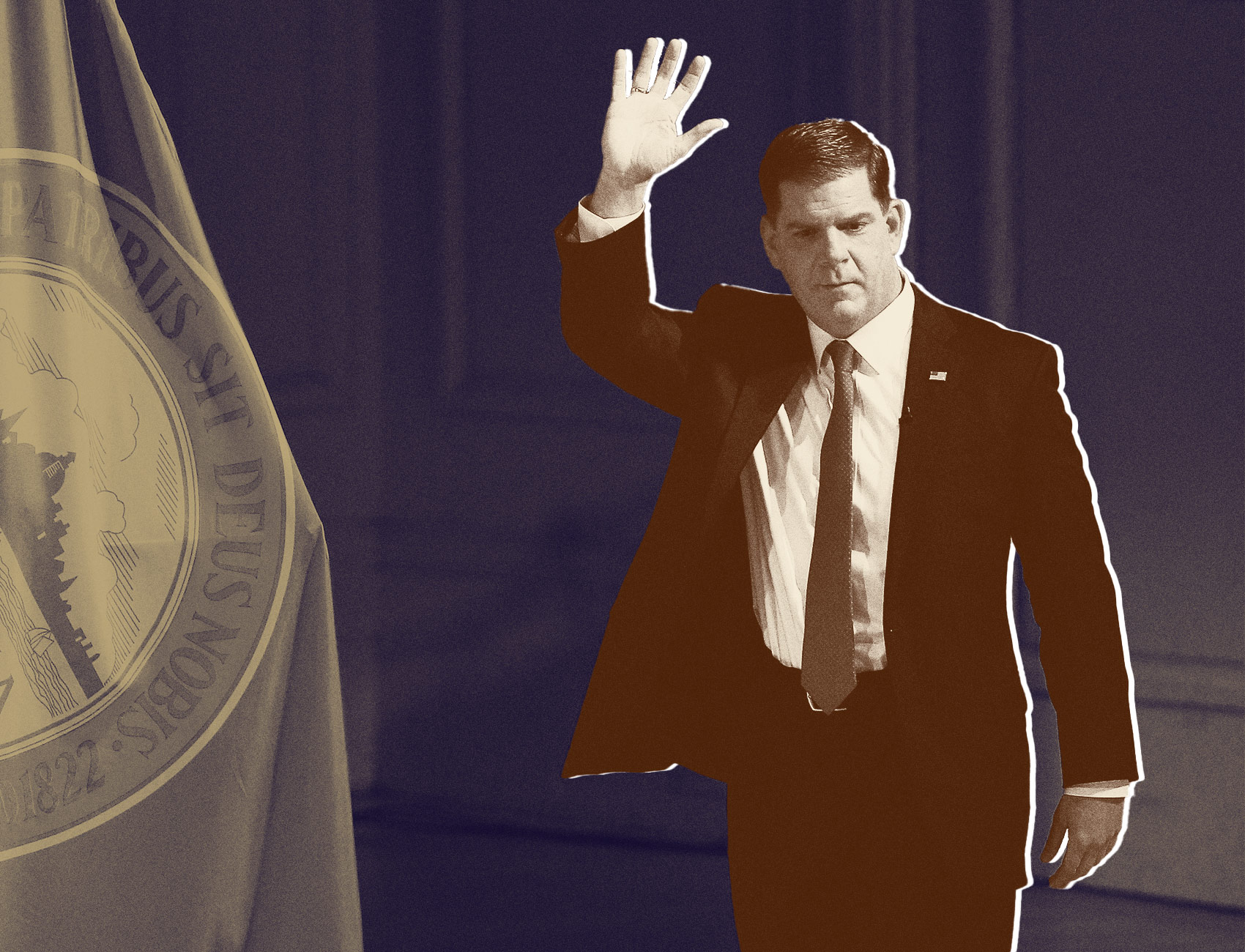Boston Mayor Marty Walsh’s Legacy of Empty Promises
There may be one reason for local progressives to support Walsh for the U.S. secretary of labor: He’ll leave town.

As President-elect Joe Biden’s expected pick for U.S. secretary of labor, Boston Mayor Marty Walsh may not seem like the worst selection. As the former head of the Laborers’ Union Local 223 and the Boston Metropolitan District Building Trades Council, Walsh certainly has old-school union bona fides, and has at least earned the endorsement of many of America’s biggest labor unions, including the United Food and Commercial Workers International Union, the Teamsters, and the AFL-CIO. But Walsh is no one’s idea of a progressive firebrand—left-leaning activists over the last few months pushed for Representative Andy Levin of Michigan, former California Labor Secretary Julie Su, or Senator Bernie Sanders of Vermont, among other candidates.
Walsh, who will deliver his State of the City address today, already has a legacy of, at best, severe missed opportunities in Boston, and, at worst, multiple scandals that should douse cold water on any progressives’ hopes that Walsh would usher in a renaissance of labor rights in America under Biden. And it’s hard to argue that Walsh deserves a promotion to a federal role after his years running the city. But there seems to be at least one reason local advocates might want Walsh, who is nearing the end of his second term as mayor, to take the job: He’ll leave Boston.
As others have repeatedly noted, Boston became a much more difficult place for low-income and working-class people to live under Walsh’s watch. Boston remains a deeply segregated and troublingly unaffordable city, issues Walsh was criticized for failing to address during his tenure in office. Numerous progressives and civil rights groups, including Sanders and the Lawyers for Civil Rights, launched criticism at the city for attempting to build a massive, 163-acre luxury development in historically working-class East Boston.
In 2019, Walsh’s administration decided to simply manhandle the city’s poorest residents. That year, the city launched “Operation Clean Sweep,” in which Boston police cracked down on a homeless encampment in the South End, seemingly in retaliation for what local media has said was an assault on a local correctional officer, though it’s unclear whether the officer himself may have provoked the encounter. At least 34 people were arrested and even more unhoused people were displaced by the raids. One witness tweeted photographs of city workers destroying wheelchairs in a garbage truck.
“They just crushed three wheelchairs!” Cassie Hurd, who leads an advocacy group for unhoused people in Boston, tweeted on Aug. 6, 2019. “It was heartbreaking to speak with Jarrod, who lost not only his wheelchair, but everything he owns that he keeps in his backpack. He was hit by a car last Tuesday. @CityOfBoston @marty_walsh this is inhumane & cruel.”
On Aug. 5, one day before Hurd tweeted the photos, two top Walsh aides were convicted of conspiring to extort organizers of the Boston Calling music festival in 2014. Then, at the end of the same month, John M. Lynch, a former city employee at the Boston Planning and Development agency, was charged with taking $50,000 in bribes to help a developer build a condo complex. Lynch later pleaded guilty and federal prosecutors later released a photo of him accepting a $5,000 payoff. Walsh denied any involvement with either plot, but the scandals severely hurt his reputation in the city.
And, perhaps most notably, Walsh has come under severe fire within the last 12 months, after categorically failing to rein in police brutality in Boston during his tenure in office. On May 29, four days after Minneapolis Police Officer Derek Chauvin killed George Floyd, Walsh published a video in which he called the killing an “act of inhumane brutality” and stated that police violence is “something we should all be talking about and working to end.”
Months later, Walsh declined to take action to end police misconduct in his own town. In December, The Appeal obtained footage of Boston Police Department officers bragging about using excessive force on participants in a protest organized by the group Black Boston, pepper-spraying demonstrators, targeting various nonviolent protesters for arrest, and even boasting about using police cars as weapons against demonstrators. In response, Walsh later called the videos “difficult to watch.”
Even when he had an opportunity to support police reforms, Walsh chose another path. On Jan. 5, Walsh announced that he was vetoing a City Council ordinance that would have strictly regulated police use of rubber bullets, tear gas, and other less-lethal weapons.
“In practice, the police commissioner here and the command staff need the authority to make decisions on the ground level that aren’t necessarily feasible based on the parameters that the City Council ordinance was putting forward,” Walsh’s spokesperson, Nick Martin, told The Appeal last week. Various City Council members sharply criticised Walsh’s decision.
If Walsh is ultimately confirmed as Biden’s secretary of labor, City Council President Kim Janey will become acting mayor until the election in November. The two leading candidates to replace Walsh are City Councilors Andrea Campbell and Michelle Wu—who each have governed to Walsh’s left during his tenure as mayor. (Wu, in particular, has significant support from progressive activists in Boston.) Of course, there’s certainly a clear argument to be made that Walsh’s list of scandals as mayor raise significant concerns that he’ll be unable to handle the responsibilities of a cabinet position—or that he may ultimately wind up harming even more people in his new role in the cabinet. But for Boston residents, at least, Walsh’s exit to join the Biden cabinet can be seen as an opportunity to put someone more competent in charge.
